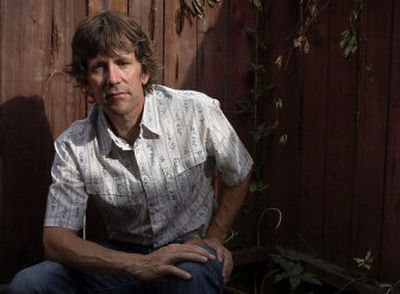Spokane author named a finalist in national awards

Spokane author Jess Walter was named a finalist Wednesday for the National Book Award for his new novel, “The Zero,” putting him in the running for one of the country’s most prestigious literary honors.
Walter was in San Francisco on a book tour in support of the new novel, and he attended Wednesday’s announcement at the famous City Lights Bookstore. He had been notified Tuesday but sworn to secrecy.
“I immediately began trying to think of who could have played such a practical joke,” said Walter, a 41-year-old Spokane native who graduated from East Valley High School and Eastern Washington University. He and his wife, Anne Windishar, are former Spokesman-Review journalists.
“The Zero” is Walter’s fourth novel. Set in an unnamed city after an unnamed terrorist attack, the fractured, grimly satirical story strongly suggests New York City after Sept. 11, 2001. It’s one of three books about that event that were named as finalists – two fiction and one nonfiction.
It’s also one of two books nominated for the award that were written by Spokane natives. New York Times reporter Timothy Egan, a Gonzaga Prep and University of Washington graduate, was nominated for his nonfiction book, “The Worst Hard Time: The Untold Story of Those Who Survived the Great American Dust Bowl.”
Finalists also included a graphic novel and two narratives in free verse, among a list of experimental works that included some notable exceptions. Big names were mostly shut out, including well-regarded novels by Cormac McCarthy, Claire Messud and Alice McDermott. Others bypassed were Thomas Pynchon’s “Against the Day,” Richard Ford’s “The Lay of the Land” and Charles Frazier’s “Thirteen Moons,” his first book since “Cold Mountain,” winner of the National Book Award in 1997.
“The list is unconventional, unexpected; this is not what you’d expect from the National Book Awards,” said Harold Augenbraum, executive director of the National Book Foundation, which sponsors the prizes. “I think the judges made really interesting choices. There are a lot of edgy narrative styles.”
Walter, whose novel “Citizen Vince” won the Edgar award for best mystery novel last year, said it was gratifying to be named a finalist for this award because it’s focused on literary fiction, and the finalists are selected by other writers.
“The book’s gotten great reviews, but with all the authors who have books out this year, I’d have never thought I’d be a finalist,” he said. “The thing about my writing is I’ve always wanted the freedom to write about a lot of different things.”
The finalists and winner are selected by a panel of writers that changes annually. They pick from more than 1,200 nominations; the winner, who will be announced Nov. 15, receives $10,000.
The award also grants literary cachet to a work, and book publishers usually tout both winners and finalists on book jackets.
“It’s huge,” said Barbara Nadeau, manager of Auntie’s Bookstore in downtown Spokane. “It’s delightful for him, and the big thing is it’s going to get him more national recognition.”
Also nominated in the fiction category was another novel with a Sept. 11 theme: Ken Kalfus’ “A Disorder Peculiar to the Country.” Other fiction finalists were Mark Z. Danielewski’s “Only Revolutions,” Richard Powers’ “The Echo Maker” and Dana Spiotta’s “Eat the Document.”
Poetry finalists were Louise Gluck’s “Averno,” H.L. Hix’s “Chromatic,” Ben Lerner’s “Angle of Yaw,” Nathaniel Mackey’s “Splay Anthem” and James McMichael’s “Capacity.”
Nominated in the young people’s category were Gene Luen Yang’s “American Born Chinese,” Patricia McCormick’s “Sold,” M.T. Anderson’s “The Astonishing Life of Octavian Nothing, Traitor to the Nation, Vol. 1,” Martine Leavitt’s “Keturah and Lord Death” and Nancy Werlin’s “The Rules of Survival.”
Other finalists in nonfiction were Taylor Branch’s “At Canaan’s Edge: America in the King Years, 1965-68,” Lawrence Wright’s “The Looming Tower: Al-Qaeda and the Road to 9/11,” Rajiv Chandrasekaran’s “Imperial Life in the Emerald City: Inside Iraq’s Green Zone” and Peter Hessler’s “Oracle Bones: A Journey Between China’s Past and Present.”